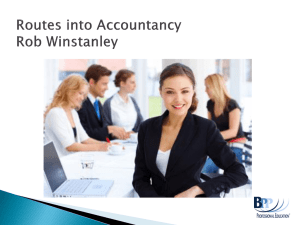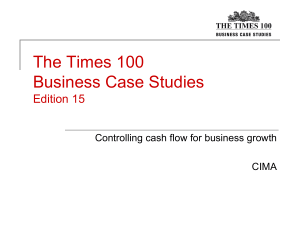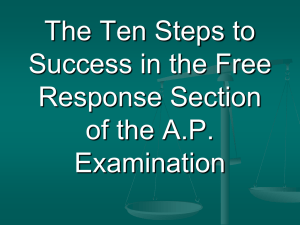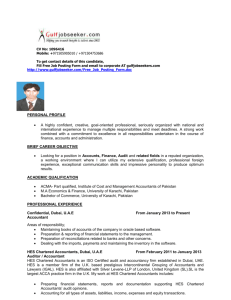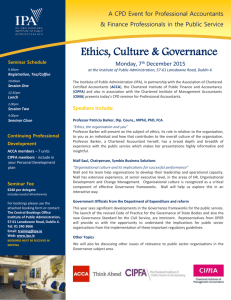TAXREP 25/09 EXTRA STATUTORY CONCESSIONS
advertisement
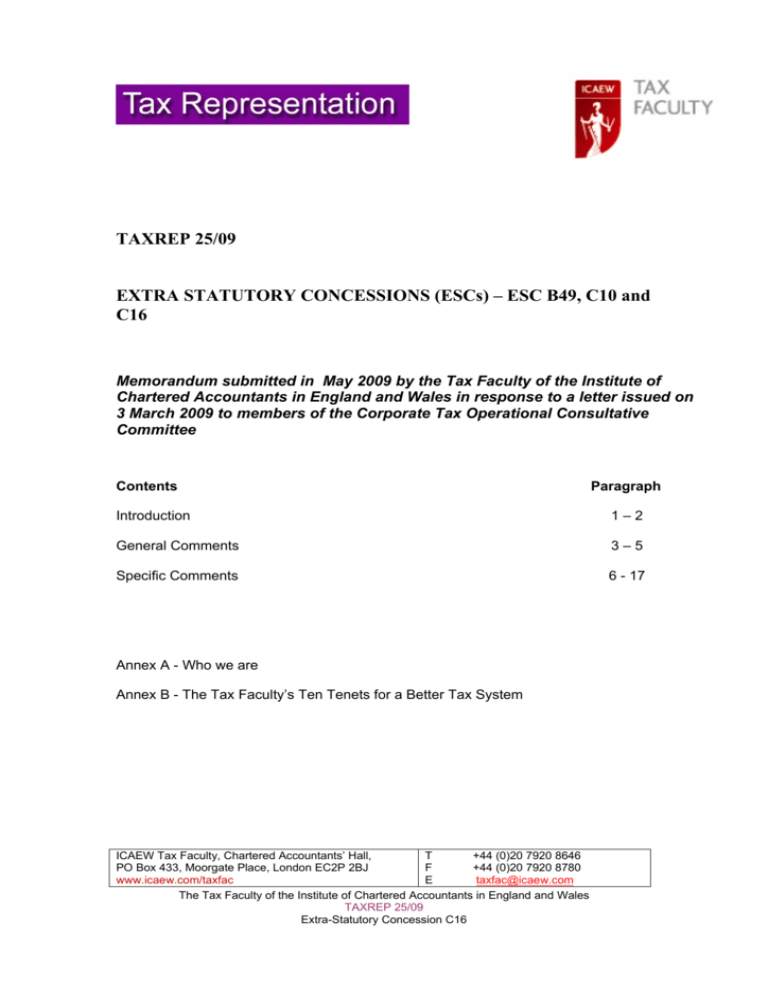
TAXREP 25/09 EXTRA STATUTORY CONCESSIONS (ESCs) – ESC B49, C10 and C16 Memorandum submitted in May 2009 by the Tax Faculty of the Institute of Chartered Accountants in England and Wales in response to a letter issued on 3 March 2009 to members of the Corporate Tax Operational Consultative Committee Contents Paragraph Introduction 1–2 General Comments 3–5 Specific Comments 6 - 17 Annex A - Who we are Annex B - The Tax Faculty’s Ten Tenets for a Better Tax System ICAEW Tax Faculty, Chartered Accountants’ Hall, T +44 (0)20 7920 8646 PO Box 433, Moorgate Place, London EC2P 2BJ F +44 (0)20 7920 8780 www.icaew.com/taxfac E taxfac@icaew.com The Tax Faculty of the Institute of Chartered Accountants in England and Wales TAXREP 25/09 Extra-Statutory Concession C16 Extra-statutory Concessions (ESCs) – ESC B49, C10 and C16 INTRODUCTION 1. We welcome the opportunity to comment on the proposal in the letter of 3 March 2009 addressed to members of the Corporation Tax Operational Consultative Committee including the ICAEW Tax Faculty. 2. Details about the Institute of Chartered Accountants in England and Wales and the Tax Faculty are set out in Annex A. Our Ten Tenets for a Better Tax System which we use as a benchmark are summarised in Annex B. GENERAL COMMENTS 3. HMRC issued a Consultation Document in November 2008 listing a number of Concessions which it was intending to legislate and we responded with our comments on these proposals in TAXREP 2/09. Annex B of the Consultation Document listed five concessions on which clarification was said to be required before legislation could be drafted. Two of these concessions were in relation to IPT and are not covered by the current consultation which, as stated above, is based on a letter of 3 March 2009 sent to members of CTOCC. 4. The three concessions which are the subject of the current consultation are: 5. ESC B49 – Section 532 Capital Allowances Act: Grants repaid ESC C10 – Group of companies: Arrangements ESC C16 – Dissolution of companies under sections 652 and 652A Companies Act 1985: Distributions to shareholders We do not have any comments on the first two concessions and, as a result, the current paper is restricted to comments in relation to Concession C16. SPECIFIC COMMENTS 6. Our answers to the specific questions in the CTOCC letter in relation to Concession C16 are set out below: How often is the ESC used? 7. We do not have any hard evidence on this but from personal experience and from comments that we have received from members we believe that there is a steady stream of companies that use this concession. We would welcome your views on the need to legislate this ESC and your perception of the likely benefits of doing so 8. Because this concession is in regular use we believe that it should be put on a statutory basis. The Tax Faculty of the Institute of Chartered Accountants in England and Wales TAXREP 25/09 Extra-Statutory Concession C16 Have you any suggestions on ways to legislate this concession without HMRC being seen to be providing statutory backing for a practice, which encourages companies to accept dissolution in preference to winding up? 9. The powers to dissolve a company which were previously in sections 652, 652A Companies Act 1985 are now contained in sections 1000 and 1003 Companies Act 2006. These powers are subject to a number of statutory safeguards, now in Companies Act 2006, in order to ensure that the powers are not subject to abuse. As a striking off is countenanced under the recently consolidated Companies Act provisions we cannot see any difficulty in introducing (fiscal) statutory provisions which support this way of dealing with the elimination of companies that have ceased trading. What criteria or condition should be imposed in the legislation? 10. We believe that the criteria or condition to be imposed by the legislation should reflect and repeat the assurances that are required under the existing extra-statutory concession. As mentioned above, HMRC have concerns that ESC C16 has been and continues to be used for avoidance purposes hence there would need to be an avoidance rule that prevent any potential new legislation from being used to gain tax advantage. We would be grateful for your suggestions in this area 11. We understand that towards the end of 2007 HMRC were seeking additional undertakings, in addition to those in the extra-statutory concession itself, before it was prepared to grant the C16 concessionary treatment. We understand that these additional conditions were to the effect that: • • 12. The company will not transfer or sell its assets or business to another company having some or all of the same shareholders; and The arrangement is not a reconstruction in which some or all of the shareholders in the original company retain an interest in the second company. We would see no problem if these additional conditions were incorporated in the new statutory provisions. Do we need to include companies struck off under their overseas jurisdictions when the provisions are similar to those of sections 652 and 652A Companies Act 1985 as part of any possible legislation? If yes, how could we mitigate any avoidance opportunities? 13. We believe that quite a number of these overseas companies are likely to have been set up to ‘own’ holiday homes abroad because of the land ownership problems that would have resulted if such properties were owned by individuals direct. We are not aware of the avoidance opportunities that HMRC may have in mind so are not in a position to suggest appropriate mitigation arrangements. 14. We also believe that the EC Treaty implications of not including overseas companies would need to be explored if it was felt appropriate to exclude The Tax Faculty of the Institute of Chartered Accountants in England and Wales TAXREP 25/09 Extra-Statutory Concession C16 such companies from the potential legislation to enact the extra statutory concession. Your perception of any problems/issues of legislating this ESC and how HMRC might mitigate them 15. We believe it will be difficult to incorporate into the legislation the existing arrangements under which the government in effect waives its right to claim up to £4,000 under the bona vacantia provisions. 16. We are not able to put forward a way in which this provision could be incorporated into statutory provisions as we are not lawyers. Any other comments or concerns 17. We have no further comments. Iky 6 May 2009 The Tax Faculty of the Institute of Chartered Accountants in England and Wales TAXREP 25/09 Extra-Statutory Concession C16 ANNEX A ICAEW AND THE TAX FACULTY: WHO WE ARE 1. The Institute of Chartered Accountants in England and Wales (ICAEW) is the largest accountancy body in Europe, with more than 128,000 members. Three thousand new members qualify each year. The prestigious qualifications offered by the Institute are recognised around the world and allow members to call themselves Chartered Accountants and to use the designatory letters ACA or FCA. 2. The Institute operates under a Royal Charter, working in the public interest. It is regulated by the Department for Business, Enterprise and Regulatory Reform through the Financial Reporting Council. Its primary objectives are to educate and train Chartered Accountants, to maintain high standards for professional conduct among members, to provide services to its members and students, and to advance the theory and practice of accountancy, including taxation. 3. The Tax Faculty is the focus for tax within the Institute. It is responsible for tax representations on behalf of the Institute as a whole and it also provides various tax services including the monthly newsletter TAXline to more than 10,000 members of the ICAEW who pay an additional subscription. 4. To find our more about the Tax Faculty and ICAEW including how to become a member, please call us on 020 7920 8646 or email us at taxfac@icaew.com or write to us at Chartered Accountants’ Hall, PO Box 433, Moorgate Place, London EC2P 2BJ. The Tax Faculty of the Institute of Chartered Accountants in England and Wales TAXREP 25/09 Extra-Statutory Concession C16 ANNEX B THE TAX FACULTY’S TEN TENETS FOR A BETTER TAX SYSTEM The tax system should be: 1. Statutory: tax legislation should be enacted by statute and subject to proper democratic scrutiny by Parliament. 2. Certain: in virtually all circumstances the application of the tax rules should be certain. It should not normally be necessary for anyone to resort to the courts in order to resolve how the rules operate in relation to his or her tax affairs. 3. Simple: the tax rules should aim to be simple, understandable and clear in their objectives. 4. Easy to collect and to calculate: a person’s tax liability should be easy to calculate and straightforward and cheap to collect. 5. Properly targeted: when anti-avoidance legislation is passed, due regard should be had to maintaining the simplicity and certainty of the tax system by targeting it to close specific loopholes. 6. Constant: Changes to the underlying rules should be kept to a minimum. There should be a justifiable economic and/or social basis for any change to the tax rules and this justification should be made public and the underlying policy made clear. 7. Subject to proper consultation: other than in exceptional circumstances, the Government should allow adequate time for both the drafting of tax legislation and full consultation on it. 8. Regularly reviewed: the tax rules should be subject to a regular public review to determine their continuing relevance and whether their original justification has been realised. If a tax rule is no longer relevant, then it should be repealed. 9. Fair and reasonable: the revenue authorities have a duty to exercise their powers reasonably. There should be a right of appeal to an independent tribunal against all their decisions. 10. Competitive: tax rules and rates should be framed so as to encourage investment, capital and trade in and with the UK. These are explained in more detail in our discussion document published in October 1999 as TAXGUIDE 4/99; see http://www.icaew.co.uk/index.cfm?route=128518. The Tax Faculty of the Institute of Chartered Accountants in England and Wales TAXREP 25/09 Extra-Statutory Concession C16

